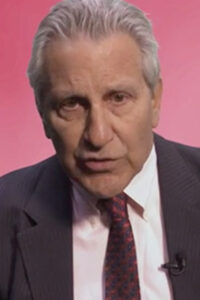
Diagnosed with type 1 diabetes as a child, Robert H. Eckel, MD, has seen firsthand the importance of breakthroughs in diabetes research.
Dr. Eckel, ADA President, Medicine & Science, is one of the less than 30% of people diagnosed with type 1 diabetes between 1950 and 1964 to live into their sixties. In that time, diabetes care has advanced from reusable needles and Clinitest tablets to glucose test strips to meters and sensors for continuous glucose monitoring.
The advances and breakthroughs continue.
“Just consider what we now know about how to assess and treat microvascular complications in the eyes, kidney, and nervous system, and all of the recent cardiovascular outcomes trials, which provide new hope for the reduction in heart attack, heart failure, stroke, and death from cardiovascular disease,” Dr. Eckel said Sunday, June 14, during his presidential address, Living Lifelong with Diabetes—So Much Accomplished, Yet So Much Still to Be Done.
The presentation can be viewed by registered meeting attendees at ADA2020.org through September 10, 2020. If you haven’t registered for the Virtual 80th Scientific Sessions, register today to access all of the valuable meeting content.
During the virtual presentation, Dr. Eckel outlines plans for a new medical subspecialty: Cardiometabolic Medicine.
Dr. Eckel and Michael Blaha, MD, MPH, Director of Clinical Research in the Ciccarone Center for the Prevention of Cardiovascular Disease at Johns Hopkins School of Medicine, designed a training program for the subspecialty to address the growing prevalence of obesity, metabolic syndrome, and type 2 diabetes. The program draws on components of preventive cardiology, metabolic aspects of endocrinology, hepatology, nephrology, and lifestyle and obesity medicine. It will be three years with a combined emphasis on research and clinical training.
“The clinical program will be a balance between clinics, inpatient experiences, and others, including noninvasive cardiac imaging, cardiac rehabilitation, lifestyle medicine, and leadership training,” said Dr. Eckel, Professor Emeritus at the University of Colorado Anschutz Medical Campus. “It’s expected that such a training program will take 10 to 15 years to establish, and initially it will grow from existing fellowships in cardiology and endocrinology/metabolism.”
Turning to diabetes research, Dr. Eckel emphasized two areas where more work needs to be done.
For type 1 diabetes, he encouraged more research to determine the environmental triggers for diabetes development in children and adults predisposed to human leukocyte antigen (HLA). The HLA locus accounts for up to half of the familial aggregation of type 1 diabetes.
In the early 20th century, genetic factors were more common triggers for type 1 diabetes in children than environmental factors. This century, that has flipped, with environmental factors becoming dominant. It’s a complex problem, said Dr. Eckel, who identified several triggers that need examination: infections/viruses, gut microbes, nutritional factors, chemicals, and climate.
“This is an area of amazing absence of science that has tremendous prophylactic value, such as a vaccine,” Dr. Eckel said.
In type 2 diabetes research, Dr. Eckel said a major research target is determining the mechanism for beta-cell failure that results in glucose-sensing defects and leads to glucose intolerance. There are many ongoing, unresolved mechanisms for beta-cell failure—glucotoxicity, lipotoxicity, endoplasmic reticulum stress, mitochondrial dysfunction, oxidative stress, islet inflammation, and increases in islet amyloid polypeptide—so the field is ripe for more intensive and focused investigation, he said.
VIEW THIS PRESENTATION
Already registered?
View this presentation at ADA2020.org
Not yet registered?
Register now to access all presentations from the Virtual 80th Scientific Sessions

